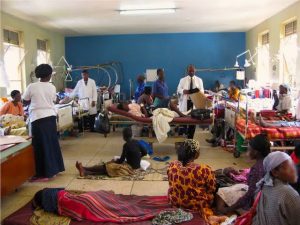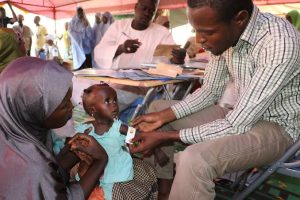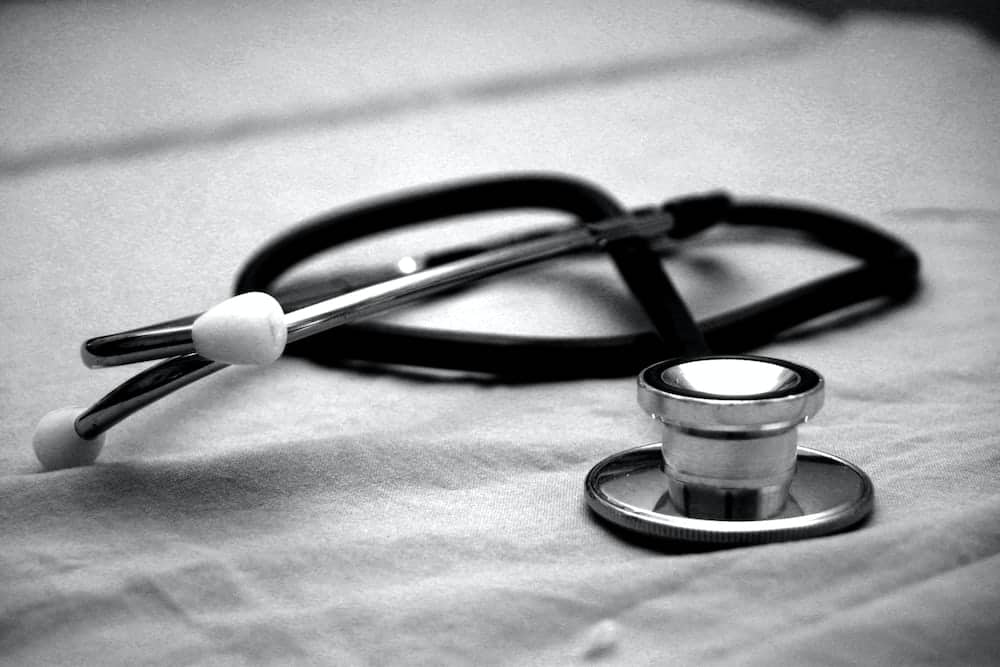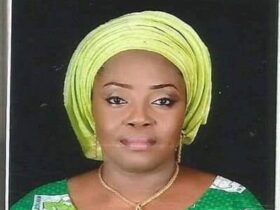In a world where medical advancements hold the promise of extending and enriching lives, there is a disturbing rift that defies borders and ignores boundaries.
This division transcends mere geography or neighborhood affiliations; it is an insidious chasm that molds destinies, dictates outcomes, and silently engulfs countless lives.
Imagine, for a moment, two contrasting worlds.
World One: Abundance of Health
In this world, gleaming hospitals, equipped with the latest medical marvels, stand as symbols of hope. Accomplished healthcare professionals and cutting-edge research offer the gift of longevity and vitality. Here, the fortunate enjoy seamless access to an abundance of medical resources, often taking it for granted, as they navigate life secure in the knowledge that health is their birthright.
World Two: A Struggle for Survival
Now, shift your focus to the second world, where even a routine check-up is a luxury. A world where the nearest pharmacy may as well be on a different continent. In this realm, illnesses fester untreated, akin to unhealed wounds. Quality healthcare is but a distant dream, and for many, the battle for survival is waged daily, silently, and without respite.
This is no work of fiction; this is the stark reality of health inequality.
In this expedition, I will peel back the layers of this stark divide. I will reveal stories of resilience amidst adversity, courage amidst despair, and the unyielding pursuit of a healthier, fairer world. I will cast a spotlight on faces and voices often relegated to the shadows, bringing their struggles and triumphs to the forefront.
Join me on this quest to comprehend, challenge, and ultimately bridge the gaping abyss of health inequality.
Together, we will bear witness to narratives that must be shared; narratives with the power to kindle change, awaken empathy, and redefine our world for the better.
Addressing Inequalities in Healthcare Access:
Research has underscored that in Nigeria, despite extensive efforts by governments at all levels since the 1970s to combat health inequalities, stark disparities persist both among and within communities. These disparities manifest as the two worlds depicted earlier, reflecting the varying ways Nigerians, from diverse locations and socioeconomic backgrounds, access healthcare.
The World Health Organization (WHO) defines Access to Health as universal health coverage, where all individuals have timely and quality access to essential health services without financial hardship. This encompasses a comprehensive range of health services, from promotion and prevention to treatment, rehabilitation, and palliative care, ultimately enhancing overall well-being and quality of life.
Nigeria’s standing in global health system performance rankings paints a troubling picture. According to a Lancet report published in 2021, the country ranks 142nd out of 195 nations in terms of healthcare access and quality. Additionally, the World Bank’s Universal Health Coverage Service Coverage Index released in 2022 highlights significant challenges.
Despite the objectives set by the National Health Act to provide basic healthcare services to all Nigerians, achieving this remains an arduous task. Primary care centres are becoming less accessible due to issues in the distribution of healthcare packages, ward-level implementation, and inadequate connections between health tiers. Consequently, those with fewer resources often resort to more expensive secondary and tertiary facilities.

Personal Struggles: Voices from Nigeria
Let me introduce you to Mrs. Attah (real name withheld), a diabetic patient residing in Adupi, a remote village in Kogi State. Her story mirrors the uphill battle faced by many. In her village, private hospitals are a luxury beyond reach, forcing residents to travel on motorcycles to neighbouring Benue State for proper healthcare, adding to their financial burdens.
Similarly, Mrs. Ayodele shares her tale of healthcare inaccessibility. In Abuja, she was asked for N25,000 just to register at a private hospital, depleting her entire budget and leaving her with no options.
Mr. Ojonugwa encountered a financial barrier when he needed dental treatment in Abuja. Unable to afford it, he sought care at the Federal Medical Center in Mararaba, Nasarawa State, delaying his treatment until he found a more affordable option.
Tragically, some have paid the ultimate price due to exorbitant medical bills, as the more affordable hospitals remain out of reach.
Then there is Mrs. Grace, a mother struggling to secure dialysis for her daughter’s severe kidney problems. She tirelessly seeks financial assistance from NGOs, radio stations, and prayer houses, as her daughter’s weekly medical expenses weigh heavily on her family.
These personal accounts illuminate the grim truths of healthcare access in Nigeria.
Barriers to Access:
Access to healthcare is not a level playing field. Disparities persist, often dictated by factors beyond an individual’s control. These disparities can be summarized in three key areas:
Financial Barriers: Many individuals face financial hurdles when seeking healthcare. High medical costs, lack of insurance, and out-of-pocket expenses can create insurmountable barriers to care.
Geographic Challenges: For some, the distance to the nearest healthcare facility is a formidable obstacle. In rural or underserved areas, the scarcity of medical providers and facilities can delay access to critical care.
Cultural Factors: Cultural beliefs, language barriers, and mistrust of the healthcare system can deter individuals from seeking timely medical attention. Cultural disparities further complicate access to quality care.
These disparities persist, impacting the well-being of individuals and communities. Addressing them is vital to achieving health equity for all.
Health Outcomes Disparities
Health disparities in Nigeria reveal stark inequalities among different populations, affecting racial, ethnic, and socioeconomic groups. Recent data highlights concerning gaps in health conditions, with notable disparities in life expectancy and mortality rates. In 2021, Nigeria’s overall life expectancy stood at 60.87 years, with disparities between males (59.07) and females (62.78). Neonatal mortality was approximately 40 per 1,000 births, while infant and under-five mortality rates were 80 and 120 per 1,000 live births, respectively. These disparities persist, revealing critical health inequalities.

Impact on Quality of Life:
Health inequalities extend beyond statistics, profoundly affecting individuals’ quality of life. Such disparities hinder their ability to work, engage in daily activities, and maintain overall well-being. Real-life stories of individuals living with these disparities illustrate the human impact.
For instance, individuals like Mrs. Ayodele and Mr. Ojonugwa are compelled to delay necessary healthcare due to financial barriers, jeopardizing their health and livelihoods. These personal accounts underscore the urgent need to address health disparities in Nigeria.
Socioeconomic Factors and Health:
Socioeconomic factors, including income, education, and employment, wield considerable influence over health outcomes. These determinants create disparities, particularly affecting vulnerable populations. Recent data underscores the profound impact of social factors on health, demanding a closer examination and targeted interventions.
Socioeconomic factors play a pivotal role in determining access to healthy living conditions. They shape access to essentials like housing, nutrition, and environmental quality. The concept of ‘food deserts,’ areas lacking access to nutritious food, exemplifies how these factors perpetuate health disparities. Addressing these inequalities is paramount for promoting health equity in Nigeria.
Healthcare System Factors and Initiatives Addressing Health Inequality
Nigeria’s healthcare system grapples with significant challenges that contribute to health inequality, particularly in urban areas. These issues must be addressed to ensure equitable access to quality healthcare.
a) Addressing Quality and Efficiency Gaps: Urban areas in Nigeria grapple with specific challenges within the National Health Insurance Authority (NHIA), where issues of quality and efficiency take precedence over the mere availability of healthcare facilities and personnel. A vital reform initiative necessitates a comprehensive restructuring of the healthcare delivery system. The ultimate objective is the implementation of empanelment, a system where primary care is led by physicians. This approach strives to provide all-encompassing, continuous, coordinated, and person-centred high-quality care. Achieving this transformation would entail specialized training for healthcare professionals in fields such as family medicine, quality management systems, and the oversight of both public and private healthcare practices.
b) Leveraging the Private Sector: Acknowledging the pivotal role played by the private sector in healthcare service delivery, Nigeria can embrace a model similar to that of the United Kingdom. In the UK, primary care is delivered by private providers under the oversight of the National Health Service (NHS). Nigeria can harness the capabilities of the private sector to enhance healthcare access, expanding the reach and effectiveness of healthcare services.
c) Mainstreaming Primary Healthcare Services: Adopting empanelment requires categorizing the population into segments served by specialized healthcare teams. Nigeria has initiated this process by establishing teams comprising nurses and Community Health Extension Workers (CHEWs) to address specific demographics. Nonetheless, there’s a need for further enhancements and alignment with NHIA services. This strategy envisions the inclusion of all primary healthcare services, including specialized programs, within NHIA, facilitating the allocation of additional resources to critical healthcare endeavours.
d) Empowering Rural Areas with Community-Based Insurance:
The existing NHIA program catering to rural dwellers is the Community-Based Insurance Scheme (CBIS). However, CBIS has faced challenges stemming from a lack of government support, weak community health development committees, poverty, and the absence of functional health facilities. To enhance CBIS utilization and community ownership, essential steps include rebuilding dilapidated healthcare facilities, government subsidies for CBIS, and extensive community awareness campaigns. Additionally, the implementation of the Vulnerable Group Social Health Insurance Program (VGSHIP) can alleviate the burden on indigent individuals in communities. The integration of telehealth and other technology-based solutions can help mitigate the shortage of professional healthcare personnel, facilitating clinical care and supervisory support for existing non-professional teams.
e) Expanding Coverage for the Informal Sector: Deepening NHIA coverage for the informal sector is a crucial step towards achieving health equity in Nigeria. This can be achieved by providing government subsidies, intensifying awareness campaigns, and making concerted efforts to boost enrollment. Learning from other developing countries, such as India and Chile, can provide valuable insights into deepening coverage for this segment of the population.
f) Initiating a Reformed Healthcare System: These proposed steps form the foundation for initiating reform within the healthcare system. By effectively utilizing available resources, this reform aims to deliver both geographical and quality access to healthcare for those currently reachable. Commitment to this roadmap is imperative for sustainable system growth, irrespective of changes in political administrations. Regulatory authorities should be integrated into the new system structure to uphold standards, monitor performance, and offer guidance, akin to established practices in developed countries.
g) Leadership and Governance Reform: Addressing issues of corruption and irresponsible leadership is fundamental to this comprehensive reform. This entails streamlining the funding, financing, and purchasing of healthcare services into transparent structures aligned with performance and objectives. The reformed Essential Package of Health Services (EPHS) should align with the basic health plans of NHIA. Increasing healthcare budgets to meet WHO recommendations of at least 15% of the national budget is imperative. Shifting the governance of primary healthcare (PHC) from local government authorities to state health insurance authorities is advocated for a more effective and professionally led system.
Conclusion
In Nigeria, the journey towards achieving equitable healthcare access and improved health outcomes has been fraught with challenges and disparities. Factors within the healthcare system, policy gaps, and socioeconomic determinants have all contributed to perpetuating health inequality. However, there is a glimmer of hope on the horizon, as promising initiatives and solutions begin to emerge. By addressing these systemic issues, bolstering healthcare infrastructure, and advocating for policy reforms, Nigeria can chart a path toward a future where high-quality healthcare is accessible to all, regardless of their background or geographical location.
This journey necessitates collective effort, but the destination—a healthier and more equitable nation—is a goal well worth pursuing.









Leave a Reply